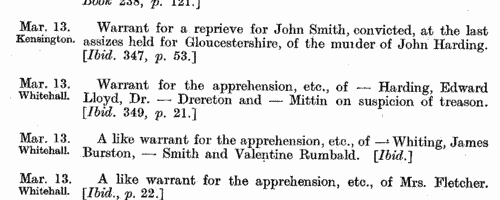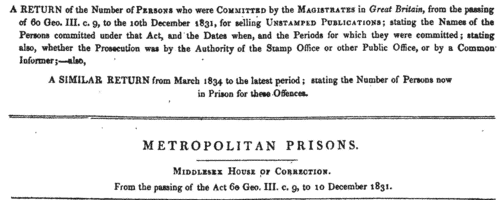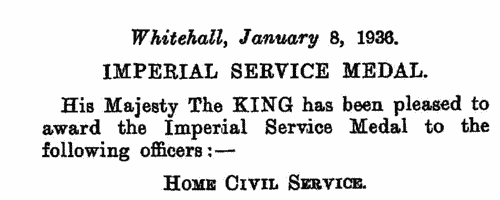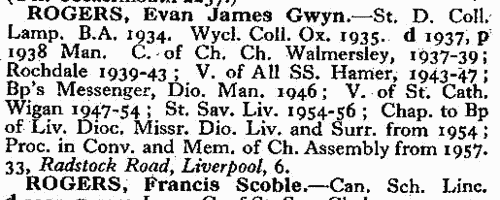Dieu Surname Ancestry ResultsOur indexes 1000-1999 include entries for the spelling 'dieu'. In the period you have requested, we have the following 10 records (displaying 1 to 10): Buy all | | | Get all 10 records to view, to save and print for £56.00 |
These sample scans are from the original record. You will get scans of the full pages or articles where the surname you searched for has been found. Your web browser may prevent the sample windows from opening; in this case please change your browser settings to allow pop-up windows from this site. Fine Rolls
(1369-1377)
The fine rolls of the 43rd to 51st years of the reign of king Edward III record part of the government administration in England, with orders sent out day by day to individual officers, and commitment of particular responsibilities and duties. There is also some material relating to Wales, Scotland, Ireland and the English possessions in France. DIEU. Cost: £4.00.  | Sample scan, click to enlarge

| Official Papers
(1697)
The State Papers Domestic cover all manner of business relating to Britain, Ireland and the colonies, conducted in the office of the Secretary of State as well as other miscellaneous records. Includes lists of passes to travel abroad.
DIEU. Cost: £4.00.  | Sample scan, click to enlarge

|  Apprentices and articled clerks
(1764) Apprentices and articled clerks
(1764)
Apprenticeship indentures and clerks' articles were subject to a 6d or 12d per pound stamp duty (late payment of the 6d rate attracted double duty (D D) of 12d): the registers of the payments usually give the master's trade, address, and occupation, and the apprentice's name, as well as details of the date and length of the apprenticeship. 2 January to 31 December 1764.DIEU. Cost: £8.00.  | Sample scan, click to enlarge

| Gaoled Newspaper Vendors in Kingston-upon-Thames House of Correction
(1834-1835)
The 1815 Stamp Act increased the tax on newspapers to fourpence a copy. Many radical newspaper publishers and the booksellers and newsagents who sold their popular papers ignored the law, and were liable to suffer prosecution either by authority of the Stamp Office which regulated the tax or by a common informer. In 1836 the House of Commons ordered these returns to be made from each prison, giving details of the convictions that had been made under the Act. The returns are not entirely consistent from one gaol to another, but most give names, dates, and period of imprisonment.DIEU. Cost: £6.00.  | Sample scan, click to enlarge

| English lawyers
(1841)
The Royal Kalendar has a Law Department listing justices and officials of the High Court of Chancery; Masters in Chancery; Crown Office; Six Clerks Office; Register Office in Chancery Lane; Office of Reports and Entries; Affidavit Office; Hanaper Office; Examiner's Office; Petty Bag and Cursitors Office; Subpoena Office; Lord Chancellors officers; Vice-Chancellor's officers; officers to the Master of the Rolls; the Public Record Office at Rolls House; the Court of Bankruptcy; the Court for Relief of Insolvent Debtors; Court of Queen's Bench; Court of Common Pleas; Court of Exchequer; Exchequer Office of Pleas; Register of Deeds in the county of Middlesex; Queen's Sergeants and Counsel; Duchy Court of Lancaster; County Palatine of Lancaster; and County Palatine of Durham; Marshalsea and Palace-Court; Court of Westminster; with lists of the Lord Lieutenants and Sheriffs in England and Wales; and officials of the Inns of Court. There is also a list of the committee of the Law Society of the United Kingdom.DIEU. Cost: £6.00.  | Sample scan, click to enlarge

|  London Policemen
(1830-1842) London Policemen
(1830-1842)
The Metropolitan Police Register of Joiners (MEPO 333/4) lists policemen joining the force through to 31 December 1842 (to warrant number 19892). The register is alphabetical, in so far as the recruits are listed chronologically grouped under first letter of surname. It is evidently a continuation of a similar earlier register, not closed until its alphabetical sections were filled: consequently, there are no entries in this register for the initial letters N, O, Q, U, V, X, Y or Z; and the sections of this register start at different dates - A 18 April 1840 (warrant number 16894); B 11 December 1830 (5570); C 7 September 1830 (4988); D 27 May 1833 (8445); E 15 December 1838 (14476); F 30 March 1832 (7372); G 1 December 1835 (11,184); H 25 April 1832 (7457); I and J 13 February 1837 (12449); K 2 January 1838 (13457); L 3 October 1834 (9905); M 15 November 1832 (7999); P 4 October 1831 (6869); R 4 September 1837 (13021); S 30 March 1835 (10366); T 6 April 1840 (16829); W 30 December 1833 (9096). The register gives Date of Appointment, Name, Number of Warrant, Cause of Removal from Force (resigned, dismissed, promoted or died), and Date of Removal. Although the register was closed for new entrants at the end of 1842, the details of removals were always recorded, some being twenty or more years later. Those recruits not formerly in the police, the army, or some government department, were required to provide (normally) at least two letters of recommendation from persons of standing, and details of these are entered on the facing pages: the names in these are indexed separately - this index refers only to the police constables. Where a recruit was only recently arrived in the metropolis, the names and addresses of the recommenders can be invaluable for tracing where he came from.DIEU. Cost: £8.00.  | Sample scan, click to enlarge

| English Pupil Teachers training to become Schoolmistresses
(1876)
The Education Department set examinations for candidates for admission into training colleges, and to become teachers. This is the class list (in order of merit) of the pupil teachers who passed that examination at Christmas 1876. The list gives the candidate's name (surname first) (prefixed by an asterisk where she was examined on second-year papers), and the school in which engaged (N. for National School, Ch. Church of England, B. British School, W. Wesleyan, R. Roman Catholic, P. Parochial, Bd. Board School, Indl. Industrial School).DIEU. Cost: £6.00.  | Sample scan, click to enlarge

| Imperial Service Medal
(1936)
Awards by kings George V and Edward VIII of the Imperial Service Medal to officers of the Home Civil Service. The names are arranged alphabetically by surname (in capitals) and christian names, with office or rank in the service. DIEU. Cost: £6.00.  | Sample scan, click to enlarge

| Anglican clergy
(1957)
Crockford's Clerical Directory listed all Anglican clergy in the British Isles, India, Africa, Canada, the West Indies, Europe, Australasia and South America. The 77th issue, for 1957-58, is based on returns from all the individuals listed, and was deemed correct as of 30 September 1957. The details given are: name (surname first, in capitals) in bold; name of theological college and/or university, and degrees, with years; a bold d followed by year and diocese signifies date of ordination as deacon and by which bishop; then a bold p, similarly for ordination as priest; posts (C: curate; I: incumbent; V; vicar; R: rector) with parishes and years; address; telephone number; and lists of books &c. where appropriate. In the case of the man then holding an English, Irish, Scottish or Welsh benefice, additional details are given - a bold P signifies the patron of the advowson; then the income, with items such as Q. A. B. (Queen Anne's Bounty), Eccles(iastical) Comm(issioners), Fees, e. o. (Easter Offerings), Pew Rents, T(ithe) R(ent) C(harge), Gl(ebe), &c.DIEU. Cost: £4.00.  | Sample scan, click to enlarge

| Group Captains: Secretarial Branch
(1957)
The Air Force List for 1957 contains gradation lists for all serving officers, corrected, generally, up to the appointments and promotions gazetted 2 April 1957. The officers are listed by branch, rank, and date of seniority; the names are given surname first, initials, decorations, and various sets of initials relating to their particular qualifications or expertise. A double-headed dagger before the name denotes a permanent direct commission; a dagger a national service commission; an asterisk some other non-permanent commission. The main abbreviations are: a. a., qualified at Army Long Gunnery Staff Course (A. A.); c. f. s., qualified flying instructor (with an asterisk if A1 category, without, A2); I, 1st class interpreter; i, 2nd class interpreter; i. d. c., completed a course at the Imperial Defence College; j. s. s. c., completed a course at the Joint Service Staff College; P, on probation; p. f. c., graduate of Pilot Flying College; p. s. a., graduate of R. A. F. Staff College; p. s. c., graduate of Military Staff College; q. s., R. A. F. graduate of the Military or Naval Staff College; Sp, medical or dental specialist; t. p., graduate of Empire Test Pilots' School; Z, qualified in A. I. S. Inspection Duties. DIEU. Cost: £4.00.  | Sample scan, click to enlarge

|
Research your ancestry, family history, genealogy and one-name study by direct access to original records and archives indexed by surname.
|













